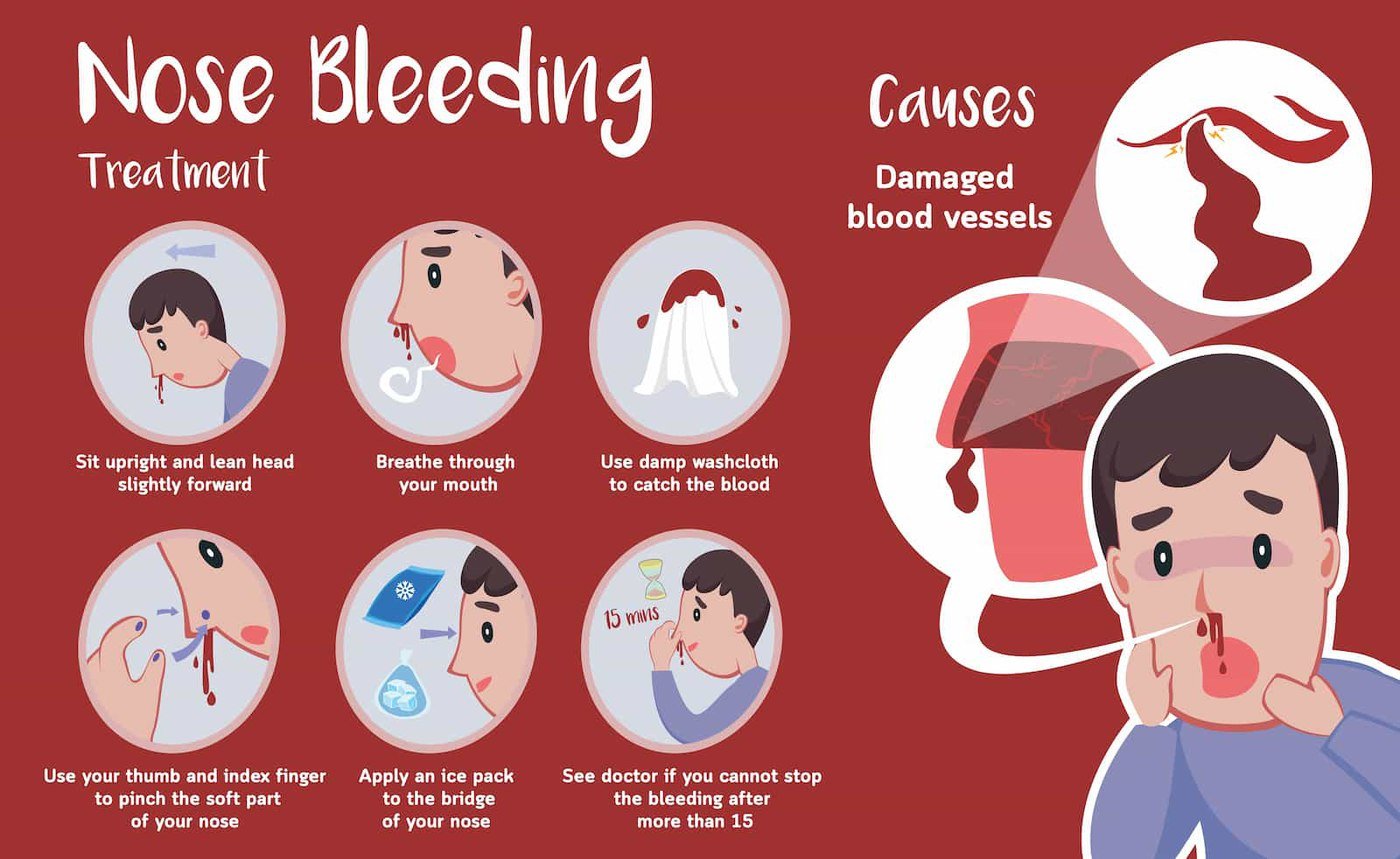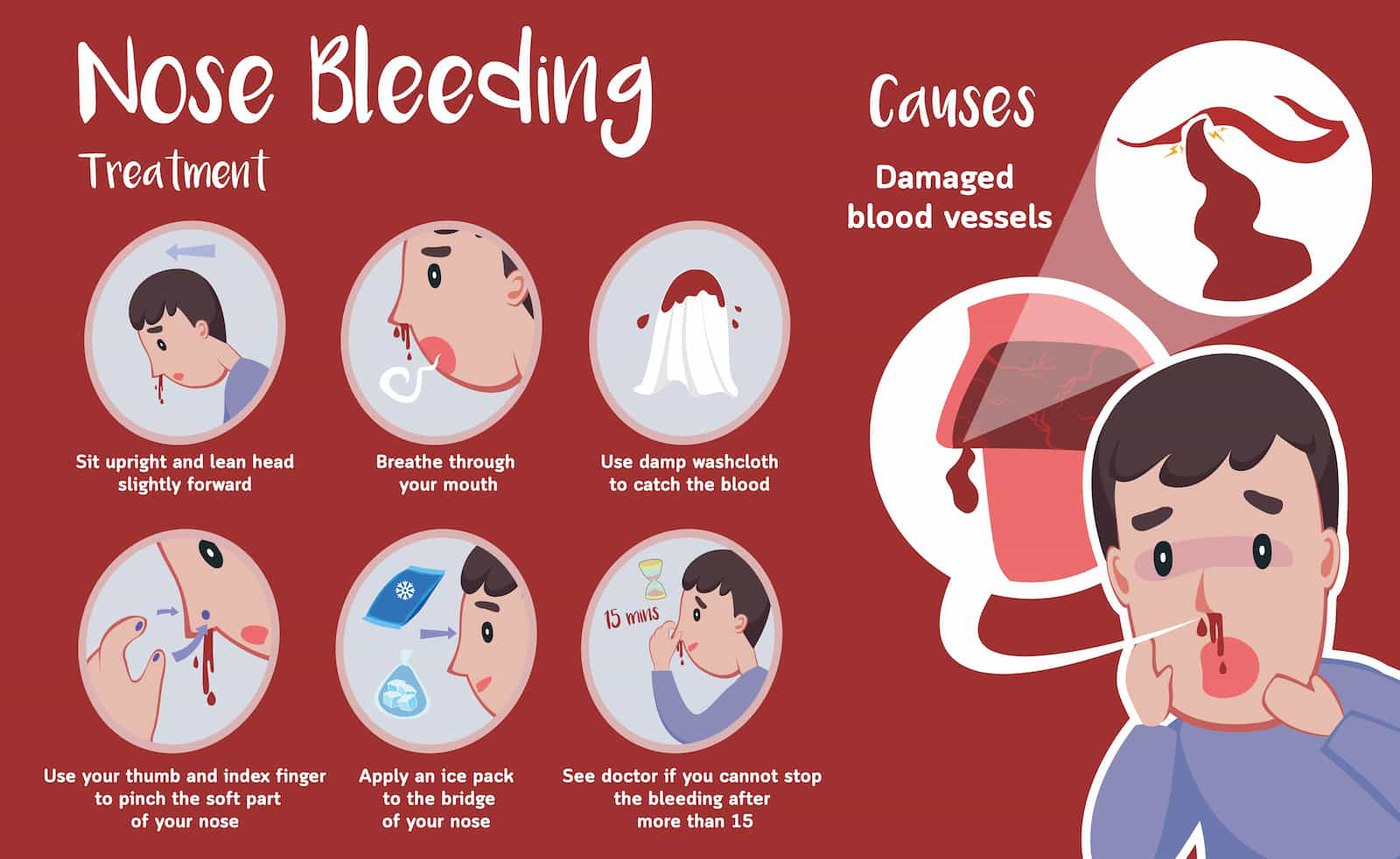Nosebleeds (Epistaxis) in Children: Causes, Risk Factors, and How to Stop Them
December 29th, 2022 | 5 min. read


Nosebleeds are common in children, particularly for ages 3 to 10 years of age. While they can be scary for parents and children alike, they are usually not a cause of serious concern.
Nosebleeds affect some children more than others. While some children may never get a nosebleed, others are prone to frequent nosebleeds. Usually, nosebleeds are not a problem, but they should not be completely ignored either, because they may be indicative of a more serious issue, especially if they happen frequently or there is a large amount of blood involved. While nosebleeds are usually not a major problem to cause concern, they’re worth learning about since there’s a lot of false information about how to stop them.
Below, we’ll go over everything you need to know about nosebleeds in children, including what causes them, risk factors, how to stop them, and when to seek help from a medical professional.
request an appointment today for your child's nosebleeds.
Servicing 10 locations throughout the Houston, TX area
What is a nosebleed in children?
Nosebleeds, also called epistaxis, are common in children. Generally speaking, nosebleeds happen when the blood vessels in the mucous membrane inside the nose are broken. Most commonly, it happens to the blood vessels closest to the nostrils in children, where there are many blood vessels that are easily damaged.
There are two main types of nosebleeds.
- Anterior nosebleeds are common because they arise in the front of the nose near the nostril.
- Posterior nosebleeds are rare and happen in the back of the nose. The result, in either case, is blood flowing out through the nostrils of the child.
What causes nosebleeds in children?
There are many causes of nosebleeds in children, including the following:
- Dryness: Dry air leads to the mucous membranes in the nose drying out and making them more prone to bleeding. Therefore, during drier seasons or drier climates, children may get more nosebleeds. Dryness paired with trauma to the blood vessels from picking, scratching, or being hit in the nose can lead to epistaxis.
- Injury to the nose: Children are often prone to injuries. Whether they’re playing ball and get hit in the nose or fall on their face, any injury directly to the nose can cause the blood vessels within to rupture and result in a nosebleed.
- Picking the nose: Similarly, picking or rubbing the nose can also result in a nosebleed.
- Blowing too hard: Blowing the nose too hard can result in irritation that can lead to the blood vessels breaking and bleeding.
- Objects in the nose: Sometimes children intentionally or mistakenly stick things inside their noses. This can also cause the blood vessels within to break and bleed.
- Colds and allergies: Colds and allergies can combine several causes into one. For example, they can dry out the nose and make the child frequently rub, blow, and scratch their nose.
- Abnormal tissue growth: Abnormal tissue growth within the nose, like polyps, can also lead to epistaxis.
What are the risk factors for nosebleeds in children?
Risk factors for nosebleeds in children include the following:
- Children living in a dry climate.
- Children frequently pick, scratch, and rub their noses.
- Children with a cold or allergies.
How to stop a nosebleed
There’s a lot of misinformation when it comes to how to stop a nosebleed. For example, many people think that it’s best to lean the head back to stop a nosebleed, when, in fact, the opposite is true. Leaning the head back will just cause the blood to pool in the nose. Putting your head between your legs is another bad way to stop nosebleeds. This will make blood flow more quickly out the nose.
Follow the steps below to stop a nosebleed:
- Keep your child calm and try to quiet them down. Talking, crying, and laughing can make the nosebleed worse, and panicking may make the nosebleeds more difficult to stop.
- Sit your child up and have them lean forward slightly. Do not lay your child down. Doing so may make your child swallow blood, which can lead to vomiting.
- Tell your child to breathe out of their mouth. Then, gently pinch the nostrils closed for 5 to 10 minutes. Wait at least 5 minutes before you check if the bleeding has stopped.
- Then, put a cold compress on the bridge of the child’s nose to slow the bleeding. Don’t use tissues or gauze.
- Repeat the above steps until it stops if the bleeding continues.
- Tell your child to avoid rubbing, picking, and blowing their nose for 2 to 3 days once the bleeding stops. This will ensure that the blood vessels will heal and not reopen.
How to prevent a nosebleed
In addition to stopping a nosebleed once it starts, it’s important to understand how to prevent them.
- Cut fingernails: Long or sharp fingernails are a big culprit when it comes to nosebleeds in children. This is because long fingernails make it easier to scratch the inside of the nose when children pick their noses. Keeping fingernails short will prevent sharp nails from scratching and breaking blood vessels in the front of the nose.
- Keep fingernails and objects out: While some young children can’t help picking their noses, it’s important to discourage this behavior. Even with short fingernails, if your child is often picking their nose, they may still get nosebleeds. Similarly, no objects should be placed on the nose. This can cut the inside of the nose and objects can easily get stuck inside. Also, dissuade your child from rubbing their nose.
- Gently blowing your nose: Teach your child to blow their nose gently, because aggressively blowing the nose can cause nosebleeds.
- Use a humidifier or cool vaporizer: Using a humidifier or cool vaporizer in your child’s bedroom at night, especially during winter, will help to keep their nasal passages moist, preventing them from drying out and getting a nosebleed.
- Use nasal ointment: Nasal ointment, specifically petroleum jelly ointments like Aquaphor or Vaseline, can be used to keep the lining of the nose moist. 2 to 3 times a day, smear a thin coat of nasal ointment inside each nostril.
- Saline nose spray: Saline nose spray will help prevent nosebleeds when your child has a cold. Spray each nostril two or more times each day.
When to seek professional help (ENT Doctor) for a nosebleed in children
If your child suffers a nosebleed and the nosebleed will not stop, it’s time to seek professional help from an Ear, Nose, and Throat (ENT) Doctor. ENT doctors specialize in medical conditions that affect the ear, nose, and throat, so it is best to go straight to them.
Other conditions that warrant professional medical help include the following:
-
Frequent/repeated nosebleeds.
-
Nosebleeds caused by injuries to the face or head.
-
Large amounts of blood from a nosebleed.
-
Your child feels weak, faint, ill, or has trouble breathing.
-
Your child bruises easily, or has bleeding in the urine, stool, or gums.
-
An object is stuck in the child’s nose. Depending on where the object is in the nose, it is usually best to have a professional remove it and address any damage to the nose.
Seek Nosebleed Help from Houston ENT & Allergy
If you live in the greater Houston area and your child suffers from nosebleeds or any of the conditions listed above, then you should schedule an appointment with Houston ENT & Allergy. Houston ENT & Allergy is a medical practice with 10 locations throughout the Houston area.
At Houston ENT & Allergy, we serve any and all customers with ear, nose, and throat problems, including children. Because we specialize in nose problems, along with ear and throat conditions, we are best equipped to diagnose and treat your child’s nosebleeds.
At each of our locations, we have board-certified doctors who are highly experienced and will be able to deliver your child the medical assistance they require, and give parents like you peace of mind that they are in good hands.
Visit our website houstonent.com to find a location near you and schedule an appointment today.
Topics:

